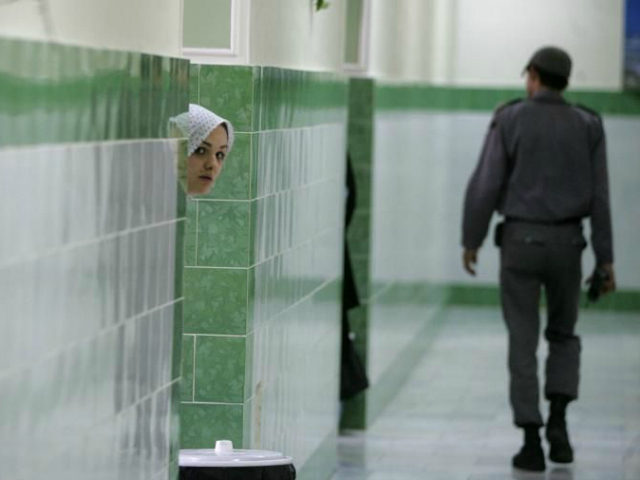The United States Treasury Department’s Office of Foreign Assets Control (OFAC), on Wednesday, sanctioned six Iranians, three Iran-based entities and leaders, the country’s state-run Islamic Republic of Iran Broadcasting (IRIB), and Iran’s notorious Evin prison for being involved with serious human rights abuses and censorship.
“Prisoners held at Evin Prison are subject to brutal tactics inflicted by prison authorities, including sexual assaults, physical assaults, and electric shock,” the Treasury Department wrote in its statement. It added that “Iran’s Ministry of Intelligence and Security (MOIS) and Islamic Revolutionary Guard Corps (IRGC) maintain permanent wards in Evin Prison where they hold political prisoners.”
OFAC also sanctioned the group Ansar-e Hezbollah (“Supporters of the Party of God” in Farsi) as “an organization supported by the Iranian regime that harasses and attacks the Iranian people.” The Department also cited the group’s alleged role in acid attacks against women who the regime saw as improperly dressed in Isfahan.
Ansar-e-Hezbollah and Evin Prison were both sanctioned under Executive Order 13553, which blocks any property in the United States or that comes into the hands of U.S. citizens from being “transferred, paid, exported, withdrawn, or otherwise dealt in.” Additionally, it prohibits “the making of any contribution or provision of funds, goods, or services by, to, or for the benefit of any person whose property and interests in property are blocked pursuant to this order.”
Abdolhamid Mohtasham, Hamid Ostad, and Hossein Allahkaram are two Iranians sanctioned for their links to Ansar-e Hezbollah. Under Executive Order 13628, they are prohibited from receiving loans or receiving credits from any U.S. financial institution, prohibited from any transactions in foreign exchange in or in the jurisdiction of the United States, and prohibited from “transfers of credit or payments between financial institutions or by, through, or to any financial institution, to the extent that such transfers or payments are subject to the jurisdiction of the United States and involve any interest of the sanctioned person.” Among other restrictions, all of their property in the United States is blocked.
“Iran not only exports terrorism and instability across the world, it routinely violates the rights of its own people,” Treasury Secretary Steven T. Mnuchin said. “The Iranian regime diverts national resources that should belong to the people to fund a massive and expensive censorship apparatus and suppress free speech. Those who speak out against the regime’s mismanagement and corruption are subject to abuse and mistreatment in Iran’s prisons.”
He added, “America stands with the people of Iran, and Treasury is taking action to hold the Iranian regime accountable for ongoing human rights abuses, censorship, and other despicable acts it commits against its own citizens.”
In addition to this, OFAC designated the Iran-based Hanista Programming Group, under Executive Order 13606, for having operated and/or directed the “operation of information and communications technology that facilitates computer or network disruption, monitoring, or tracking that could assist in or enable serious human rights abuses by or on behalf of the Government of Iran.”
As Breitbart News reported in February, the “Hanista Programing Group is responsible for creating and distributing alternative versions of the popular messaging and social media application Telegram that facilitate the Iranian regime’s monitoring and tracking of Iranian and international users.” Further, “Hanista is an IRGC front company introduced as a programming group which focuses on enabling Iran’s cyber commerce with mobile apps in Farsi. Hanista is controlled by the IRGC’s Intelligence organization.”
On February 15, the National Council of Resistance of Iran (NCRI) revealed how the IRGC developed hundreds of smartphone apps currently being used by the Iranian regime to spy on its own citizens and developed covert apps to mimic apps they banned to achieve the same aim.
Some of these apps were even made available on iTunes through the Apple Store and Google Play. However, following the NCRI press conference, Google announced it would investigate the information and removed the Telegram Black app, which was meant to mimic Telegram which the Iranian regime blocked in Iran, from its marketplace.
Two Iranian Regime Officials, Abolhassan Firouzabadi and Abdolsamad Khoramabadi, have also been sanctioned in conjunction with their attempts to block, censor, and limit everyday Iranians from access to vital communications platforms, thereby inhibiting their freedom.
EO 13606 calls for the “blocking the property and suspending entry into the United States of certain persons with respect to grave human rights abuses by the governments of Iran and Syria via information technology.”
The Treasury Department noted that “Abolhassan Firouzabadi is responsible for the Iranian government’s efforts to block social media applications like Telegram and to force Iranians to use state-run applications that are monitored by the regime.”
Finally, OFAC designated Abdulali Ali-Asgari, the current Director General of the Islamic Republic of Iran Broadcasting (IRIB), for being complicit in the state-run and operated news network “for restricting or denying the free flow of information to or from the Iranian people.”Abdulali Liasgari was also sanctioned for his involvement with the IRIB.
Breitbart News reported in April, “Thousands, of Ahwazi Arabs gathered in the capital city of Iran’s Khuzestan province for the ninth consecutive day to protest against the Islamic Republic of Iran Broadcasting (IRIB) corporation after they allegedly omitted any mention of the Arab culture during a children’s show celebrating Iran’s “diversity” on Nowruz, or the Persian New Year.”
Adelle Nazarian is a politics and national security reporter for Breitbart News. Follow her on Facebook and Twitter.

COMMENTS
Please let us know if you're having issues with commenting.